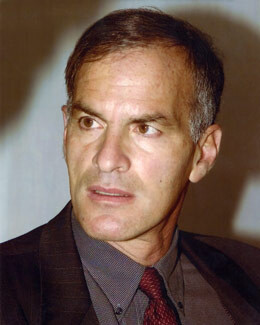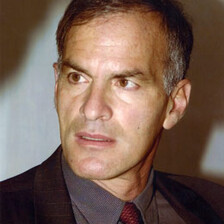The Electronic Intifada 10 May 2007

Norman Finkelstein
In discussing Finkelstein’s case on Democracy Now, Avi Shlaim, Oxford professor and notable scholar on the Israel-Palestine conflict, stated, “Israel has no immunity to criticism, moral immunity to criticism, because of the Holocaust. Israel is a sovereign nation-state, and it should be judged by the same standards as any other state. And Norman Finkelstein is a very serious … a … well-informed … and hard-hitting critic of Israeli practices in the occupation and dispossession of the Palestinians.”
Finkelstein’s academic credentials speak for themselves. He received his doctorate from Princeton University on the Theory of Zionism and has since gone on to publish a number of works on the topic including, The Holocaust Industry and Image and Reality of the Israel-Palestine Conflict. Most recently, Finkelstein authored, Beyond Chutzpah. This latter work includes a vigorous critique and breakdown of Alan Dershowitiz’s, The Case for Israel. Dershowitz unsuccessfully attempted to prevent the publication of Beyond Chutzpah through threats of a lawsuit and a plea to Governor Schwartzenager to stop publication; nonetheless the University of California Press did in fact publish the book. Having failed to bury Beyond Chutzpah Dershowitz then proceeded to intervene in Finkelstein’s academic career at DePaul University as a means of silencing him.
As early as 2005, Dershowitz began sending the President of the University as well as other faculty, staff, and students, lengthy articles and documents attacking Finkelstein. In a recent Wall Street Journal op-ed Dershowitz claims that he “was specifically asked by the former chairman of DePaul’s political science department to ‘point [him] to the clearest and most egregious instances of dishonesty on Finkelstein’s part.’” What Dershowitz leaves out of his claim is that this request was not made out of the blue. It came in June of 2006, well over a year after Dershowitz initiated contact with the DePaul professor who wrote the letter, other faculty, and DePaul’s President Father Holtschneider. The solicitation in question reads:
“I have contacted Professor Peter Novick to follow up on his indictment which you quoted in your letter of November 10, 2005, to Father Holtschneider and in the manuscript titled ‘Literary McCarthyism’ which you sent me the previous year.”
It is worth noting the oddity of even considering Dershowitz’s evaluation of Finkelstein in that Dershowitz himself is not considered a scholar on the Israel-Palestine conflict. Additionally, DePaul’s political science committee evaluated the accusations waged against Finkelstein and concluded that the accusations were not founded in any legitimate criticism of his scholarship. The Department invited two independent scholars from the University of Chicago and the University of Pennsylvania, chosen for their expertise on the Israeli-Palestine conflict, to evaluate the academic merit of Finkelstein’s work. They concluded that his work was an important contribution to the field.
Sadly, the interference of Dershowitz and others has jeopardized the integrity of the tenure process.
DePaul’s normal tenure process has three stages: Departmental, Collegiate, and University. The final recommendation from all levels must then receive a stamp of approval from the president of DePaul University, Rev. Holtschneider. According to DePaul’s own stated criteria a professor’s tenure bid is evaluated based on their teaching, scholarship, and service to the University. If the professor is found to be strong in two of the three criteria, particularly teaching, then tenure will most likely be awarded.
In Finkelstein’s case the Political Science Department voted 9-3 in favor of granting him tenure and the College voted unanimously (5-0) to award tenure. On Friday April 13, 2007, Finkelstein met with the University board, the outcome of which is rumored to come within the next week. Even then the President of the University must approve it.
By all accounts things have gone in Finkelstein’s favor. However, the Dean of the College attached a letter of dissent, not unlike Bush’s signing statements, siding with the Department’s minority opinion and going against the College level’s own recommendation. The Dean acknowledges that students find Finkelstein’s teaching to be exceptional and that the College level found his scholarship to be sufficiently noteworthy and praiseworthy to be granted tenure. Left with no legitimate way of opposing Finkelstein’s tenure bid, the Dean relies on appealing to the Catholic, and specifically Vincentian, tradition of the University, essentially creating a whole new basis for evaluating tenure — Vincentian personalism.
The Dean proceeds to discuss Finkelstein’s lack of collegiality and respect for the opinions of others. In response to a focus on the tone of Finkelstein’s scholarship and not the substance itself, the Academic Association of University Professors (AAUP) of Illinois issued a statement stating “On Collegiality as a statement for Faculty Evaluation,” “Certainly an absence of collegiality ought never, by itself, to constitute a basis for … denial of tenure …”. Moreover, as Professor Kirstein at Saint Xavier University points out, “Tonality is usually a red herring to destroy controversial speech that elites don’t like.”
If we are to be honest with what has taken place here we must acknowledge, as I know Finkelstein would be the first to do, that what he is experiencing is nothing compared to what Palestinians face on daily basis in the Occupied Territories and exile. What is important is the ability for people in the west to make an honest and truthful evaluation of the Israel-Palestine conflict.
In the last year there has been a failed attempt to oust Joseph Massad from Colombia University where falsified accusations were made against that Professor’s treatment of students in his classroom who did not share his opinion. Renowned Professors Steven Walt and John Mersheimer came under heat after they released a paper detailing the negative influence of the Israeli lobby has on U.S. foreign policy. Despite the media assault on Jimmy Carter’s book, Peace not Apartheid, it did go on to become a best seller. All of this seems to speak to the fact that the truth is making its way to the public forum and perhaps threatening the fabric of lies that are required for Israel to continue the policies it currently utilizes.
The tremendous effort to silence Finkelstein seems rooted in the fact that Finkelstein has dared his entire career to unabashedly speak the truth, risking his livelihood and a thing he loves dearly — teaching. In an interview on Democracy Now, Raul Hillberg, a scholar credited with founding holocaust studies, stated quite movingly, “[i]t takes an enormous amount of academic courage to speak the truth when no one else is out there to support him … So I would say that his place in the whole history of writing history is assured, and that those who in the end are proven right triumph, and he will be among those who will have triumphed, albeit, it so seems, at great cost.
The AAUP of Illinois, in commenting on this case stated, “[w]e respectfully submit this statement to express our conviction that the surest protection of academic excellence is academic freedom.” The shameless efforts by Dershowitz and others to suppress this freedom are a sign not of their strengths, but in fact a reflection of their fear in letting the truth be heard. As a DePaul alumni, I have known DePaul intimately. I know that the institution and its students are strong enough to handle this academic freedom, if the University has the courage to allow it.
Whether or not DePaul caves to pressure, Finkelstein’s work will likely maintain the same voice and integrity, while the rest of us must resist the temptation of self-censorship.
Bitta Mostofi is a member of the Electroinc Iraq editorial team and a long time human rights activist. Bitta received her Bachelor’s and Juris Doctor degrees from DePaul Univeristy in Chicago. She currently works as a civil rights attorney at the Council on American-Islamic Relations in Chicago.


